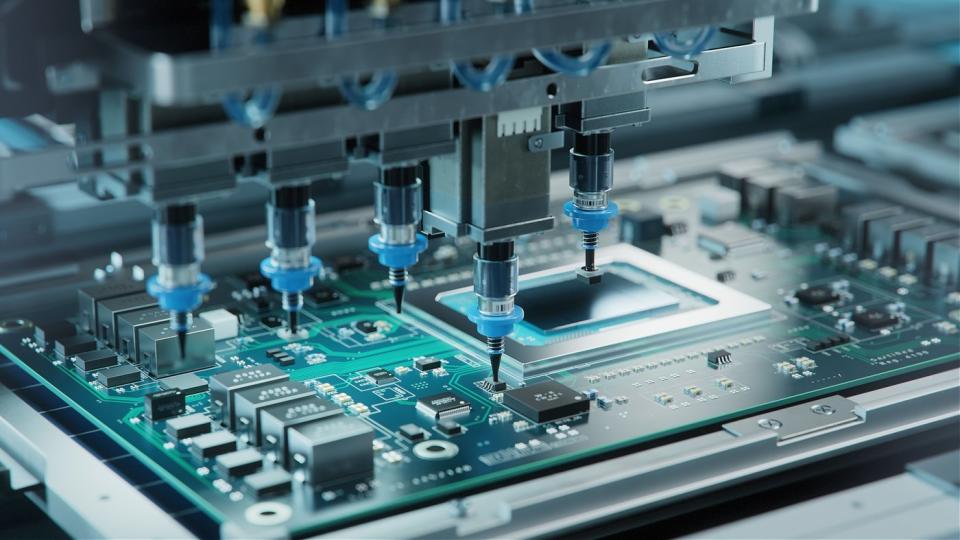Semiconductors are essential to modern technology, and the pandemic helped to accelerate its adoption by pushing many individuals and corporations to digitize. This surge in demand for microchips has continued post-pandemic.
The introduction of generative artificial intelligence (AI), along with the Internet of Things (IoT), 5G, and autonomous vehicles, have all contributed to the continued progress of the semiconductor industry.
The good news is that you can share in the spoils of this rapid growth. The semiconductor sector includes solid growth companies that are seeing their revenue and profits soar. By parking some of your money in these stocks, your portfolio can enjoy stellar capital gains over time. These businesses should have a dominant market share and a business model that can help them capture sustainable growth.
Here are two attractive semiconductor stocks whose share prices could soar in the coming years.

1. Synopsys
Synopsys (NASDAQ: SNPS) is the market leader in designing and testing complex chips, as well as the models and processes for companies to manufacture these chips. With silicon chips becoming more advanced due to the progress of IoT, AI, and 5G, Synopsys’ services are in great demand. Foundries need guidance on the complexities of these designs to effectively produce these chips.
The company has demonstrated steady growth, with revenue rising from $4.2 billion in fiscal 2021 (ended Oct. 31) to $5.8 billion in fiscal 2023. Net income climbed from $757.5 million to $1.2 billion over the same period. The business also generated an average positive free cash flow of $1.5 billion over these three fiscal years.
This strong performance has continued into the first nine months of fiscal 2024. Revenue rose 16.6% year over year to $4.5 billion, and operating income climbed 23% to $1 billion. Net income was 30% higher than the prior year at $1.1 billion, and the company had positive free cash flow of $725.4 million.
Management is predicting strong momentum and expects full fiscal 2024 revenue to increase by 15% year over year to a new record. The company’s long-term objectives include double-digit revenue growth, free cash flow margins in the mid-30% range, and earnings per share in the mid-teens.
Sassine Ghazi, who was named CEO in January this year, said that design cycles are shortening while chip complexity is increasing, both of which are positive signs for Synopsys. AI is driving demand for high-performance computing in data centers, smartphones, and personal computers. The innovation that comes with evolving AI needs will require more-complex chipsets, which should drive higher business volumes for the company.
Synopsys acquired Ansys in January for around $35 billion to help increase its portfolio of products and technologies, making it complementary to its business.
With this purchase, Synopsys expects to see its total addressable market increasing by 50% to around $28 billion, which will grow at roughly 11% per annum, creating significant business opportunities for the combined company.
2. Nvidia
Nvidia (NASDAQ: NVDA) is a market leader in graphics processing units (GPUs) with a market share of around 88% in 2024. GPUs are ideal for powering AI, machine learning, and other uses.
Nvidia has grown at breakneck speed over the last three fiscal years, and management believes this is just the tip of the iceberg. Revenue more than doubled from $26.9 billion in fiscal 2022 (ending Jan. 31) to $60.9 billion in fiscal 2024. Net income tripled over the period to $29.8 billion from $9.8 billion.
Free cash flow rose from $8.1 billion in fiscal 2022 to $27 billion in fiscal 2024.
In the first six months of fiscal 2025, this strong momentum continued. Revenue more than doubled year over year to $56.1 billion while net income leaped from $8.2 billion in the previous year to $31.5 billion. Free cash flow for the first half of fiscal 2025 was $28.5 billion, already exceeding the total for the whole of fiscal 2024. The company also pays a quarterly cash dividend of $0.01 per share.
CEO Jensen Huang said that demand remains very strong as data centers seek to upgrade for accelerated computing and generative AI.
Nvidia’s next-generation GPU, the Blackwell, failed to ship in the second quarter of calendar 2024 because of a manufacturing defect, causing widespread grief for many customers, which were relying on the new GPU to power their AI requirements.
But Huang assured buyers that Blackwell chips are now in full production and will start being shipped in the fourth quarter of this calendar year.
A bright outlook for semiconductor sales
Semiconductor sales experienced a cyclical year-over-year decline in 2023 because of the surge in pent-up demand for electronic products during the pandemic. The Semiconductor Industry Association announced that global sales fell by 8.2% year over year to $526.8 billion after falling from their 2022 peak.
However, there are strong indicators that 2024 and 2025 will see a sharp rebound and continued growth for the industry. World Semiconductor Trade Statistics, a group that tracks the industry, forecasts that global semiconductor sales will grow 16% year over year for 2024, followed by a 12.5% year-over-year rise in 2025 to hit $687 billion.
SEMI, representing more than 300 businesses in the industry, predicts 3.4% year-over-year growth for global sales of semiconductor manufacturing equipment to $109 billion for this year, followed by 17% year-over-year expansion to $128 billion for 2025.
These projections bode well for Synopsys and Nvidia, and both companies should see firm demand for their products and services.
Should you invest $1,000 in Nvidia right now?
Before you buy stock in Nvidia, consider this:
The Motley Fool Stock Advisor analyst team just identified what they believe are the 10 best stocks for investors to buy now… and Nvidia wasn’t one of them. The 10 stocks that made the cut could produce monster returns in the coming years.
Consider when Nvidia made this list on April 15, 2005… if you invested $1,000 at the time of our recommendation, you’d have $740,704!*
Stock Advisor provides investors with an easy-to-follow blueprint for success, including guidance on building a portfolio, regular updates from analysts, and two new stock picks each month. The Stock Advisor service has more than quadrupled the return of S&P 500 since 2002*.
*Stock Advisor returns as of September 23, 2024
Royston Yang has no position in any of the stocks mentioned. The Motley Fool has positions in and recommends Nvidia and Synopsys. The Motley Fool has a disclosure policy.
2 Semiconductor Stocks That Could Go Parabolic was originally published by The Motley Fool
Source Agencies



